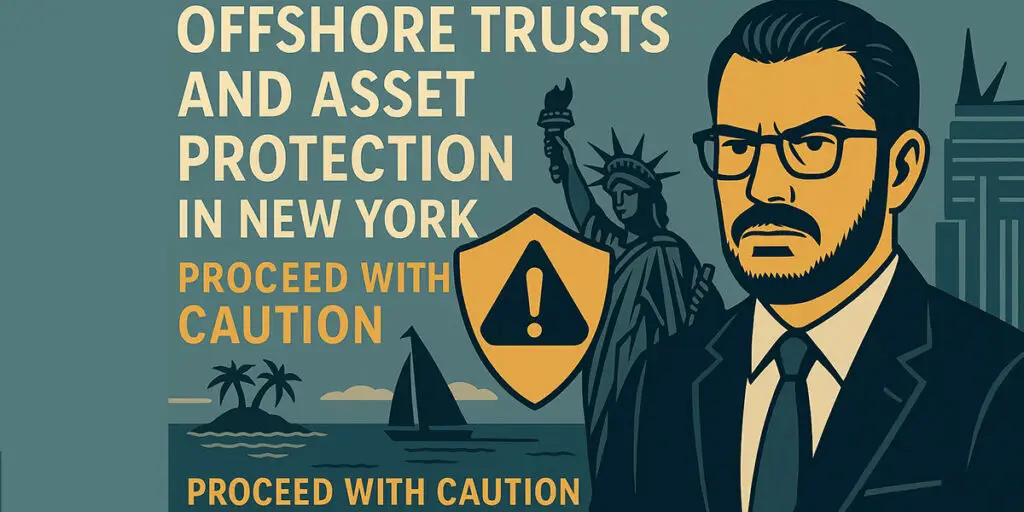Offshore Trusts and Asset Protection in New York: Proceed with Caution and Ensure Legal Compliance
For New York residents seeking robust asset protection strategies, offshore trusts may seem like an appealing option. Established in foreign jurisdictions with favorable asset protection laws, these trusts can shield assets from creditors, lawsuits, and other potential claims. However, it’s crucial to approach offshore trusts with caution and a thorough understanding of the legal and tax implications. Failing to do so can result in significant penalties and even criminal charges. Strict compliance with US laws is paramount. At Morgan Legal Group, serving New York City and beyond, we advise clients on the potential benefits and risks of offshore trusts, ensuring they understand the legal and ethical considerations and comply with all applicable regulations. This comprehensive guide explores the key aspects of using offshore trusts for asset protection in New York, emphasizing the importance of proceeding with caution and seeking expert legal counsel. It is important only to transfer these funds with trusted assistance.
What is an Offshore Trust?
An offshore trust is a trust established in a foreign jurisdiction, often a country with favorable asset protection laws and tax regulations. These jurisdictions are often referred to as “offshore havens.” Setting them up can provide certain benefits that can be very useful for you and your family. However, this should all be considered with the proper legal oversight. This can be very useful to high-worth individuals.
Common characteristics of offshore trusts:
- Located in a foreign jurisdiction
- Favorable asset protection laws
- Strict confidentiality rules
- Potential tax advantages
Offshore trusts are often used to protect assets from creditors, lawsuits, and government actions. They can have a great reward if done the right way, and it makes sense for you. There are numerous advantages.
Perceived Benefits of Offshore Trusts: Asset Protection and Tax Minimization
Proponents of offshore trusts often tout their potential benefits for asset protection and tax minimization. The advantages will be different for everyone.
Perceived benefits include:
- Asset Protection: Offshore trusts can potentially shield assets from creditors and lawsuits, as they are located in jurisdictions with laws that make it difficult for creditors to reach the assets.
- Tax Advantages: Some offshore jurisdictions offer favorable tax regulations, allowing you to reduce your income tax, estate tax, or gift tax liability.
- Confidentiality: Offshore trusts can provide a degree of confidentiality, as the details of the trust and its beneficiaries are often kept private.
While these benefits may seem appealing, it’s important to understand the risks and limitations of offshore trusts. Do not just seek the benefits; do research on what it takes to get there. Thorough research is important before making any decisions.
The Reality of Offshore Trusts: Complex Legal and Tax Implications
While offshore trusts may offer potential benefits, they also involve complex legal and tax implications that must be carefully considered. The advantages need to be looked at carefully before action is taken. An experienced attorney should be consulted. There is a legal process that must be complied with.
Complications may include:
- U.S. Tax Reporting Requirements: U.S. citizens and residents are required to report their ownership of foreign trusts to the IRS, and failing to do so can result in significant penalties.
- The “Grantor Trust” Rules: Under U.S. tax law, most offshore trusts established by U.S. persons are treated as grantor trusts, meaning the grantor (the person creating the trust) is taxed on the trust’s income, even if they do not receive it.
- Sham Trust Doctrine: The IRS may challenge offshore trusts that lack economic substance or are used primarily to avoid taxes.
- Creditor Rights: U.S. courts may be able to reach the assets in an offshore trust, particularly if the trust is deemed to be a sham or fraudulent transfer.
These complexities require careful planning and expert legal guidance. You do not want to face more complications because you were not following the proper steps. It will end up making you feel more defeated.
U.S. Tax Reporting Requirements: Form 3520 and Foreign Bank Account Reporting (FBAR)
U.S. citizens and residents who create or transfer assets to an offshore trust are required to report these transactions to the IRS on Form 3520, Annual Return to Report Transactions with Foreign Trusts and Receipt of Certain Foreign Gifts. Failure to report these transactions accurately can result in significant penalties. Having these records is extremely important.
You may also be required to report any foreign bank accounts associated with the trust on FinCEN Form 114, Report of Foreign Bank and Financial Accounts (FBAR), if the aggregate value of all foreign accounts exceeds \$10,000 at any time during the year. Compliance with these requirements is essential. Compliance protects you from penalties. The attorney can walk you through them.
The Grantor Trust Rules: Understanding How You Will Be Taxed
Under U.S. tax law, most offshore trusts established by U.S. persons are treated as grantor trusts. This means that the grantor (the person creating the trust) is taxed on the trust’s income, even if they do not receive it. It is important to understand if it does not work for you. All things must be taken into account to get the very best plan you deserve.
The grantor trust rules can significantly reduce the tax benefits of an offshore trust, as you will still be responsible for paying taxes on the trust’s income. These regulations can take all of the potential benefits from you. You do not want to end up with no benefits. Expert advice is essential.
The Sham Trust Doctrine: Avoiding IRS Scrutiny
The IRS may challenge offshore trusts that lack economic substance or are used primarily to avoid taxes. These are often referred to as “sham trusts.” If the IRS determines that a trust is a sham, they may disregard the trust and treat the assets as if they were still owned by the grantor. Having the funds or assets be questioned is not the goal. Complying with tax laws is crucial.
To avoid IRS scrutiny:
- The trust must have a legitimate business purpose
- The trustee must be independent and act in the best interests of the beneficiaries
- The trust assets must be managed prudently
- The trust must comply with all applicable laws and regulations
Economic substance and proper management are key to avoiding IRS challenges. Protect yourself by following these tips. Getting IRS approval and knowing all legal avenues is the first step. Seek assistance from those who can help.
Creditor Rights: Can U.S. Courts Reach Assets Held in Offshore Trusts?
While offshore trusts can provide a degree of asset protection, it’s important to understand that U.S. courts may be able to reach the assets in certain circumstances. This is something that has to be taken into account. It is also important to understand when you go into the plan. The potential of losing those assets may be a risk you are not willing to take.
U.S. courts may be able to reach the assets if:
- The trust is deemed to be a sham or fraudulent transfer
- The grantor retains too much control over the trust assets
- The creditor can prove that the trust was established with the intent to defraud creditors
The asset protection benefits of offshore trusts are not absolute and depend on the specific facts and circumstances. Plan to prevent any problems that can occur. This can help to make sure your assets are not touched for the long run.
Due Diligence is a Must
If you’re considering establishing an offshore trust, it’s essential to perform thorough due diligence on the jurisdiction, the trustee, and the overall structure of the trust. Due Diligence is a must for all involved with your estate. You want to make sure you can trust your partners, your lawyers, and those who are there to assist. This should not be taken lightly as there are potential risks.
Consider:
- The jurisdiction’s laws regarding asset protection and taxation
- The trustee’s experience and reputation
- The costs and fees associated with establishing and maintaining the trust
- The potential risks and drawbacks of the trust
Thorough due diligence can help you make an informed decision. An informed choice will help make everything easier and help give you the confidence to move forward. Expert research is invaluable.
The Importance of Legal Counsel Before Setting Up an Offshore Trust
Before establishing an offshore trust, it’s crucial to seek legal counsel from an experienced estate planning attorney who is knowledgeable about international tax law and asset protection. You should always seek counsel before planning a task. This may seem counterintuitive, but to have everything properly executed, an attorney is needed. The attornies also may protect your business.
An attorney can help you:
- Evaluate whether an offshore trust is right for you
- Structure the trust to comply with all applicable laws and regulations
- Minimize potential tax liabilities
- Protect your assets from creditors and lawsuits
Expert guidance is essential for navigating the complexities of offshore trusts. Enlisting the help of an attorney can also be beneficial for financial health. A lawyer can help secure your future. You may think it is a hassle, however that should not be the case.
Ethical Considerations: Transparency and Honesty in Estate Planning
When engaging in estate planning, it’s important to act ethically and honestly. This includes being transparent with your attorney about your assets, your financial situation, and your goals. It also means avoiding any actions that are designed to defraud creditors or evade taxes. The plan requires honesty.
Ethical conduct is essential for maintaining your integrity and ensuring your estate plan is legally sound. All documentation should be done correctly. Ethical and legal standards are essential in law.
Alternatives to Offshore Trusts for Asset Protection in New York
If you are concerned about the complexity, cost, or potential risks of offshore trusts, there are several alternative asset protection strategies you can consider in New York. There are other options available that can help. It is important to seek help from experts so you can know what these options are. They can also tailor them to your individual situation.
Alternative asset protection strategies include:
- Domestic Asset Protection Trusts (DAPTs)
- Limited Liability Companies (LLCs)
- Exempt Assets (e.g., retirement accounts, homestead exemption)
- Liability insurance
These strategies may offer a more straightforward and cost-effective way to protect your assets. It will all depend on your situation what you need to do. These are great ways to protect your assets. Speak with an attorney about what your financial landscape looks like.
Working with Morgan Legal Group: Protecting Your Assets and Securing Your Future
At Morgan Legal Group, we understand the complexities of asset protection and estate planning. Our experienced attorneys are dedicated to providing personalized and effective legal services to individuals and families throughout New York City and beyond. We are committed to helping you protect your assets, minimize taxes, and ensure your wishes are honored. Schedule a consultation today and learn more. Also, make sure to check out our Google My Business page with this link here. Our team is here for you.
Morgan Legal Group proudly serves the New York City community, including the Bronx, Brooklyn, NYC, Queens, and Staten Island. If you are outside of New York City, we also serve Long Island, including Suffolk County. As well as Westchester, Ulster County, and Orange County. NY Courts


